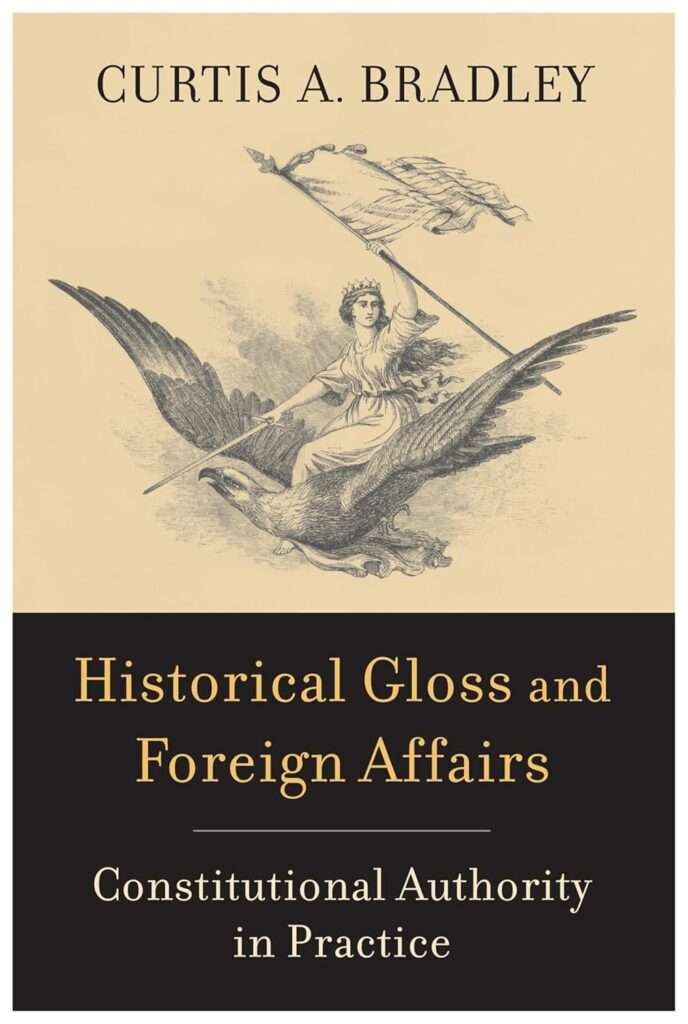
I’m thrilled to announce that Professor Curtis A. Bradley from the University of Chicago will be our guest blogger this week, discussing his latest book. Here’s a brief overview of the book provided by the publisher:
A fresh perspective on the constitutional law surrounding foreign affairs, as shaped by presidential and congressional actions throughout history.
Over the course of more than 230 years since the Constitution’s inception, the legal framework governing foreign affairs has undergone significant changes. However, these changes did not come about through formal amendments or Supreme Court decisions. Instead, they were shaped by the practices of Congress and the executive branch, known as “historical gloss.”
Curtis A. Bradley explores this evolutionary process, demonstrating how expansions in presidential authority in foreign affairs have often been justified by historical gloss. However, Congress has not merely acquiesced. Contrary to popular belief in the dominance of the “imperial presidency” in foreign affairs, Congress has also asserted its authority through historical gloss, claiming powers in the international arena that are not explicitly outlined in the Constitution and challenging exclusive presidential powers.
Historical Gloss and Foreign Affairs puts forth a constitutional theory that explains these legal developments. While originalist interpretations of the Constitution often overlook significant post-ratification developments, nonoriginalist theories tend to focus on court rulings rather than the actions and rationale of Congress and the executive branch. The constitutional theories that do consider practice typically emphasize specific moments in time.
However, the constitutional law governing foreign affairs reveals a long-term accumulation of nonjudicial precedents characteristic of historical gloss. By recognizing gloss as a key driver in the evolution of foreign affairs law, we can appreciate its broader significance as a prominent and longstanding form of constitutional reasoning.
Here are some endorsements for the book:
“An instant classic. As the leading expert in the nation on constitutional law and foreign affairs, Curt Bradley has penned the definitive work on the subject. Historical Gloss and Foreign Affairs is essential reading for anyone seeking to understand the development of constitutional law, and its relevance could not be more timely.”―Michael Gerhardt, University of North Carolina School of Law
“Outstanding. With precision and subtlety, Curt Bradley elucidates how presidents have acquired immense power and how Congress can curb them when necessary. A truly exceptional book!”―Jean Galbraith, University of Pennsylvania Carey Law School
“Historical Gloss and Foreign Affairs is the definitive exploration of how historical practices influence the distribution of constitutional power in foreign affairs, where the constitutional text often provides inadequate guidance for legitimate practices. Its compelling explanation of how historical gloss shapes constitutional interpretation is also a valuable contribution to constitutional theory at large.”―Jack Goldsmith, Harvard Law School
“One of the most comprehensive works on U.S. foreign relations law ever written. Bradley delivers a masterful analysis of all key topics and presents a compelling argument about the impact of historical gloss on shaping doctrine.”―Paul Stephan, University of Virginia School of Law
“A perceptive guide to how the Constitution has adapted to significant shifts in foreign affairs practices over time—and how it may continue to do so in the future.”―Monica Hakimi, Columbia Law School




